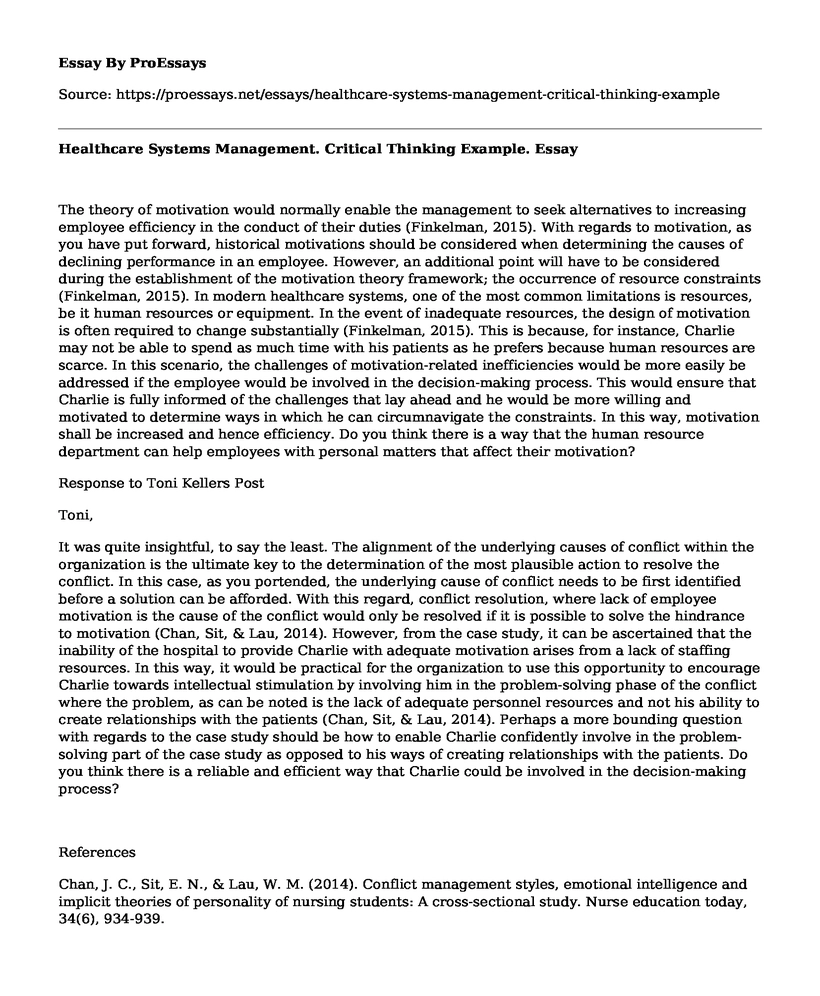The theory of motivation would normally enable the management to seek alternatives to increasing employee efficiency in the conduct of their duties (Finkelman, 2015). With regards to motivation, as you have put forward, historical motivations should be considered when determining the causes of declining performance in an employee. However, an additional point will have to be considered during the establishment of the motivation theory framework; the occurrence of resource constraints (Finkelman, 2015). In modern healthcare systems, one of the most common limitations is resources, be it human resources or equipment. In the event of inadequate resources, the design of motivation is often required to change substantially (Finkelman, 2015). This is because, for instance, Charlie may not be able to spend as much time with his patients as he prefers because human resources are scarce. In this scenario, the challenges of motivation-related inefficiencies would be more easily be addressed if the employee would be involved in the decision-making process. This would ensure that Charlie is fully informed of the challenges that lay ahead and he would be more willing and motivated to determine ways in which he can circumnavigate the constraints. In this way, motivation shall be increased and hence efficiency. Do you think there is a way that the human resource department can help employees with personal matters that affect their motivation?
Response to Toni Kellers Post
Toni,
It was quite insightful, to say the least. The alignment of the underlying causes of conflict within the organization is the ultimate key to the determination of the most plausible action to resolve the conflict. In this case, as you portended, the underlying cause of conflict needs to be first identified before a solution can be afforded. With this regard, conflict resolution, where lack of employee motivation is the cause of the conflict would only be resolved if it is possible to solve the hindrance to motivation (Chan, Sit, & Lau, 2014). However, from the case study, it can be ascertained that the inability of the hospital to provide Charlie with adequate motivation arises from a lack of staffing resources. In this way, it would be practical for the organization to use this opportunity to encourage Charlie towards intellectual stimulation by involving him in the problem-solving phase of the conflict where the problem, as can be noted is the lack of adequate personnel resources and not his ability to create relationships with the patients (Chan, Sit, & Lau, 2014). Perhaps a more bounding question with regards to the case study should be how to enable Charlie confidently involve in the problem-solving part of the case study as opposed to his ways of creating relationships with the patients. Do you think there is a reliable and efficient way that Charlie could be involved in the decision-making process?
References
Chan, J. C., Sit, E. N., & Lau, W. M. (2014). Conflict management styles, emotional intelligence and implicit theories of personality of nursing students: A cross-sectional study. Nurse education today, 34(6), 934-939.
Finkelman, A. (2015). Leadership and management for nurses: Core competencies for quality care. Pearson.
Cite this page
Healthcare Systems Management. Critical Thinking Example.. (2021, Apr 01). Retrieved from https://proessays.net/essays/healthcare-systems-management-critical-thinking-example
If you are the original author of this essay and no longer wish to have it published on the ProEssays website, please click below to request its removal:
- Children with Disabilities in Foster Care Systems - Research Paper Examlple
- Legal Nursing Liabilities Essay
- Multi-Agency Emergency Event Paper
- Essay Sample on How Policy Can Affect Public and Private Healthcare in this Country
- Inventory Management in Med Devices Supply Chain: Challenges & Opportunities - Essay Sample
- Essay Example on Living with Heart Failure: Understanding & Managing the Condition
- Teaching Children with Disabilities - Free Paper Sample







